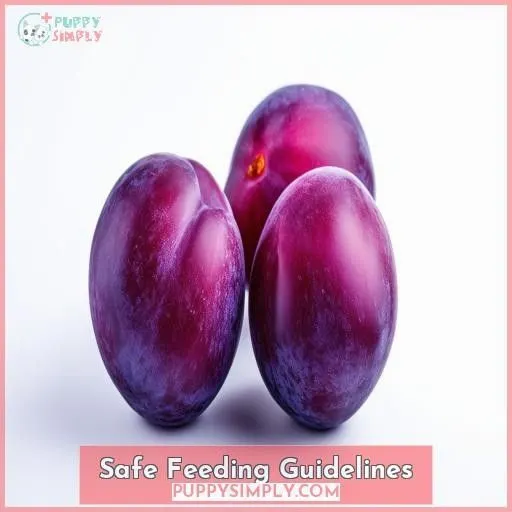This site is supported by our readers. We may earn a commission, at no cost to you, if you purchase through links.
 Yes, dogs can eat purple plums!
Yes, dogs can eat purple plums!
These stone fruits offer a tasty, fiber-rich treat with vitamins A and C for immune support. However, you’ll need to remove the pit and stem first, as they contain trace cyanide that’s toxic for pups.
Practice portion control too – no more than 1-2 plum wedges per 10 lbs to prevent tummy troubles from the high sugar content. Monitor closely for any concerning reactions.
With proper precautions, plums can be a delicious way to nourish your furry friend’s health. But read on to learn the key do’s and don’ts regarding sharing this juicy snack.
Table Of Contents
Key Takeaways
- Listen up, pet parents! While those juicy purple plums may seem like a tempting treat for your furry friend, you’ll need to take some precautions before sharing the fruity goodness. Remember, the pit and stem are a big no-no – they can be a choking hazard or even cause some serious tummy troubles if ingested.
- Now, don’t go overboard with the plum portions, folks! These little guys pack a punch of natural sugars, so moderation is key. Too many plums could lead to weight gain or digestive issues for your pup. Think of them as an occasional indulgence, not a daily dietary staple.
- Keep a watchful eye on your pup after introducing plums for the first time. Every dog is different, and some may have sensitivities or allergic reactions to these stone fruits. If you notice any concerning symptoms like rashes, vomiting, or lethargy, it’s best to steer clear of plums and consult your trusty vet.
- And let’s not forget the golden rule: if your pup happens to swallow a plum pit, it’s time for emergency mode! Those little seeds contain trace amounts of cyanide, which can be toxic for our furry friends. Don’t hesitate to seek veterinary care right away – better safe than sorry when it comes to your pup’s health.
Can Dogs Eat Purple Plums?
Yes, dogs can eat purple plums in moderation as an occasional treat. However, plum pits and stems should be removed as they can cause intestinal obstruction, and excessive consumption may lead to gastrointestinal upset due to the high sugar and fiber content.
Can Dogs Eat Plums?
You may have wondered if your furry friend can indulge in the sweet, juicy goodness of plums.
The short answer is yes, dogs can eat plums in moderation as an occasional treat.
However, there are some important caveats. The pit and stem must be removed as they can pose a choking hazard or cause intestinal blockages if ingested.
Additionally, plum skin and plum juice can be safely consumed, but dried plums, plum compote, and plum syrup should be avoided due to their high sugar content.
When feeding plums to dogs, always prioritize portion control and monitor for signs of plum toxicity or digestive distress.
Nutritional Benefits
Plums offer a range of nutritional benefits for dogs, as they’re a good source of fiber to promote healthy digestion, as well as vitamins A and C for immune support. They also provide potassium, an essential mineral that plays a role in muscle function and maintaining fluid balance.
Fiber Content
You’ll be pleased to know that plums are an excellent source of fiber for your pup. The fiber content aids digestion, preventing obesity and diabetes. Just remember to remove the pit and feed plums as occasional treats, not a regular part of their diet. The high fiber makes plums a guilt-free indulgence for your furry friend.
Vitamin a and C
In addition to fiber, plums also provide vitamin A and C, which offer eye health and immune support due to their antioxidant properties. You’ll find these essential nutrients in plums:
- Vitamin A for vision and cell growth
- Vitamin C to boost immunity
- Antioxidants fight free radicals
- Promote overall wellbeing
Plums offer a nutritious treat with benefits beyond just fiber—enjoy their vitamins A and C guilt-free.
Potassium
Plums provide a potassium-packed punch, helping maintain your pup’s fluid balance and muscle function. This essential mineral promotes healthy nerves and kidneys too. However, go easy – too much potassium can disrupt Fido’s electrolyte levels. As a low-calorie treat, plums offer crucial potassium in moderation for your furry friend.
Potential Risks
While plums offer nutritional benefits, you should be cautious about their high sugar content, which can contribute to obesity in dogs. Additionally, dogs with sensitive stomachs may experience digestive issues like diarrhea or vomiting after consuming plums.
High Sugar Content
You’ll want to be mindful of your pup’s sugar intake when feeding plums. Their high sugar content can contribute to weight gain and obesity, especially for dogs prone to packing on pounds. For diabetic dogs, the high glycemic index of plums may cause blood sugar spikes. Moderation is key – plums make a tasty treat, but shouldn’t replace balanced meals.
Digestive Issues
In addition to the high sugar content, plums can also cause digestive issues in some dogs with sensitive stomachs. You might notice gastrointestinal upset like vomiting, diarrhea, or stomach pain after your pup indulges. If their stomach seems upset, it’s best to avoid giving them more plums for a while.
Pit Toxicity
Plum pits pose a serious risk, containing trace amounts of cyanide which can cause:
- Digestive distress
- Breathing difficulties
- Potential organ damage
Prevent pit ingestion by thoroughly removing them before feeding. Even a small amount left behind could lead to an intestinal blockage or choking hazard. If you suspect your dog ate a pit, contact your vet immediately for advice on next steps.
Safe Feeding Guidelines
To safely feed plums to your dog, you must thoroughly remove the pit and stem, as they pose choking hazards and toxicity risks. While plums can be a nutritious treat, practice portion control by offering only small amounts to prevent excessive sugar intake or digestive upset.
Removing Pit and Stem
You’ll want to remove the pit and stem completely before feeding plums to your pup. The pit poses a serious choking hazard and contains traces of cyanide – toxic if ingested. Use a paring knife or your fingers to carefully extract the pit, then snip off the stem. Consider safer, seedless fruits like bananas or watermelon as alternative treats.
Portion Control
Moderation is key when feeding your pup plums. Here are some portion control tips:
- Offer just 1-2 plum wedges per 10 lbs of body weight
- Limit daily intake to no more than 10% of their diet
- Treat plums as occasional snacks, not meal replacements
While delicious, plums are high in natural sugars. Proper portion sizes prevent weight gain and related issues.
Monitoring for Reactions
After introducing plums, carefully monitor your pup for reactions like rash, lethargy, behavior changes, dehydration, or seizures. Dogs have varying tolerances, so observe closely for any signs of distress. If adverse effects arise, discontinue feeding plums and consult your veterinarian immediately for guidance on keeping your furry friend safe and healthy.
Emergency Situations
If your dog ingests a plum pit, it’s imperative to monitor for signs of obstruction, such as vomiting, diarrhea, abdominal pain, and loss of appetite. Should these symptoms arise, seek immediate veterinary attention, as the pit poses a risk of toxicity and potential intestinal blockage.
Ingesting Pit
If your pup accidentally ingests a plum pit, it’s imperative to act swiftly. These seeds contain cyanide compounds that are highly toxic. They also pose a serious choking hazard and risk of intestinal blockage. Consult your vet immediately for emergency care and guidance on monitoring for potential toxicity signs.
Signs of Obstruction
If your pup ingests a plum pit, watch closely for signs of an intestinal blockage – vomiting, diarrhea, abdominal pain, loss of appetite. Dehydration and electrolyte imbalances from obstruction can rapidly lead to sepsis, so don’t delay. An X-ray may reveal the pit, requiring emergency surgery to remove it safely.
Seeking Veterinary Care
If your pup swallows a plum pit or shows signs of obstruction like vomiting or lethargy, don’t delay – seek emergency vet care immediately. Your vet can induce vomiting or perform surgery to remove the pit if needed. Plum pit toxicity and blockages require prompt treatment, so trust your instincts and consult your vet at the first sign of trouble.
Frequently Asked Questions (FAQs)
Are there any plum varieties safer for dogs?
Any plum variety is safe for dogs as an occasional treat, provided you remove the pit and stem. Some lower-sugar varieties like pluots or plumcots may be preferable for dogs with diabetes or obesity.
Can plums cause allergic reactions in dogs?
Like a delicate flower, some dogs may have an allergic reaction to plums’ pollen. While rare, itching, sneezing, or rashes could occur if your pup’s immune system overreacts. Monitor for signs after first-time plum treats and consult your vet with concerns.
How many plums can a dog safely consume?
As a general rule, you shouldn’t give your dog more than one small plum per 10 lbs of body weight in a day. Too many can lead to digestive upset or obesity due to the sugar content.
Are there alternatives to plums for dog treats?
You bet your bottom biscuit there are! From carrot coins to bites of banana, all kinds of dog-friendly fruits and veggies make nutritious, yummy alternatives to plums as tasty treats for your furry friend.
Can plums interfere with medications in dogs?
Yes, plums could interfere with certain medications in dogs. The fiber content might affect absorption, so it’s wise to consult your vet about adjusting dosage or timing if your pup takes daily prescriptions.
Conclusion
Unexpectedly, can dogs eat purple plums?
Yes, but with care!
While plums offer fiber, vitamins A and C, and potassium, their high sugar content mandates portion control.
Remember to remove the toxic pit and stem.
Monitor closely for adverse reactions after feeding small, occasional plum wedges corresponding to your pup’s weight.
With proper precautions, purple plums can be a delightfully nourishing occasional treat for your furry companion.










